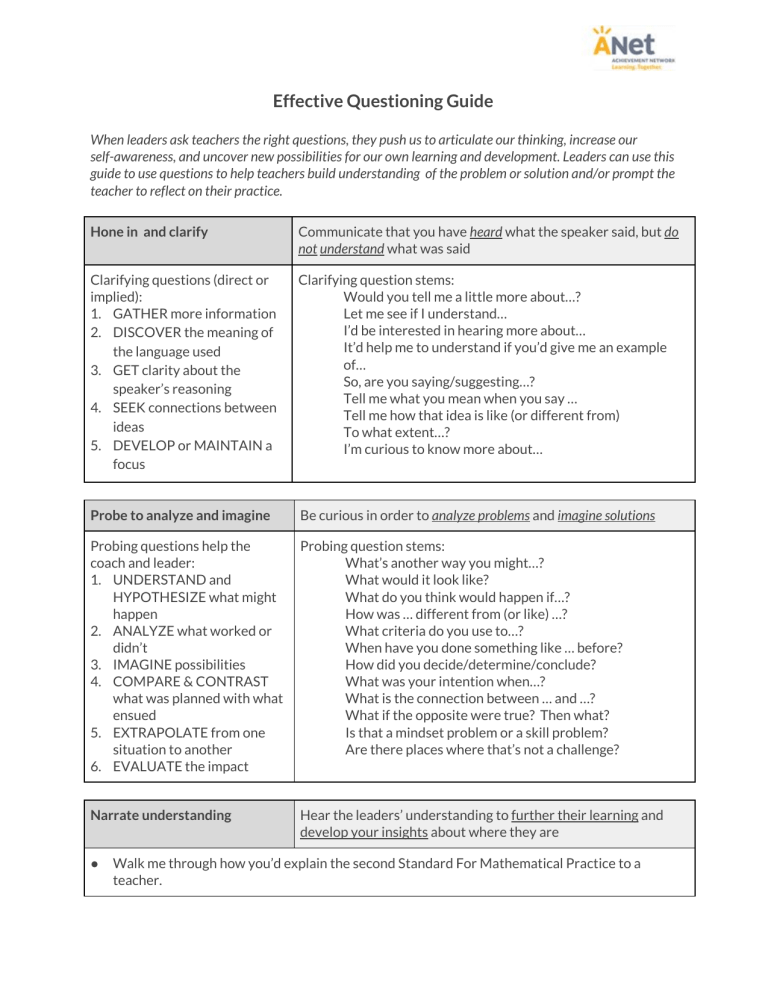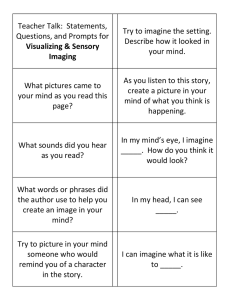
Effective Questioning Guide When leaders ask teachers the right questions, they push us to articulate our thinking, increase our self-awareness, and uncover new possibilities for our own learning and development. L eaders can use this guide to use questions to help teachers build understanding of the problem or solution and/or prompt the teacher to reflect on their practice. Hone in and clarify Communicate that you have heard what the speaker said, but do not understand what was said Clarifying questions (direct or implied): 1. GATHER more information 2. DISCOVER the meaning of the language used 3. GET clarity about the speaker’s reasoning 4. SEEK connections between ideas 5. DEVELOP or MAINTAIN a focus Clarifying question stems: Would you tell me a little more about…? Let me see if I understand… I’d be interested in hearing more about… It’d help me to understand if you’d give me an example of… So, are you saying/suggesting…? Tell me what you mean when you say … Tell me how that idea is like (or different from) To what extent…? I’m curious to know more about… Probe to analyze and imagine Be curious in order to analyze problems and imagine solutions Probing questions help the coach and leader: 1. UNDERSTAND and HYPOTHESIZE what might happen 2. ANALYZE what worked or didn’t 3. IMAGINE possibilities 4. COMPARE & CONTRAST what was planned with what ensued 5. EXTRAPOLATE from one situation to another 6. EVALUATE the impact Probing question stems: What’s another way you might…? What would it look like? What do you think would happen if…? How was … different from (or like) …? What criteria do you use to…? When have you done something like … before? How did you decide/determine/conclude? What was your intention when…? What is the connection between … and …? What if the opposite were true? Then what? Is that a mindset problem or a skill problem? Are there places where that’s not a challenge? Narrate understanding Hear the leaders’ understanding to further their learning and develop your insights about where they are ● Walk me through how you’d explain the second Standard For Mathematical Practice to a teacher. ● ● ● ● What would we see students do if they master that standard? In 5 words or less, summarize Reading Standards 1-3 Where in PARCC will students see Prose Constructed Response? How many will they complete? So how is 5.NF.1 different from what students learned in 4th grade? Zoom out Make connections to goals and priorities Examples: ● How should this planning meeting connect to your school-wide priority on writing? ● You have a school-wide priority on X. How does this discussion connect to it? ● How satisfied do you feel about the progress you’re seeing towards X academic priority? How should we adjust approach to it? ● Let’s each spend 2 minutes writing what we believe are our schools’ priorities. <Have everyone share and discuss alignment or lack of alignment.> ● If I were to ask a teacher right now, “What are the 2 most important things for your to accomplish this cycle,” what would they say? ● What are you looking for when you review XX? What’s most important to you of those things? What do you predict you’ll see? ● Are you surprised or is this what you expected? Where are you pleasantly surprised? ● "Why do I want you thinking about this before you go into this classroom today?" Back to the Future ● ● ● ● ● Anticipate challenges and define vision Pre-mortem: if you fail at this, what would that look like/sound like? What needs to be true so that doesn’t happen? Imagine your teachers 6 weeks from now. Describe what they will be doing that will let you know you’ve achieved success. What’s the biggest barrier you see to getting teachers to do X. How will you address that? For this teacher PD, how would a teacher complete this stem if you’re successful “I used to think ________, but now I think _________.” What are you most concerned about? Pave the Path Define what success will look like and h ow you might get there Creating a solution together helps set a vision for success and follow-through. ● What does this make you want to do next? What will success look like? What will make this feel motivating to your teachers? How does this fit with the culture you’re trying to build? With the academic priorities you’ve already invested your teachers in? ● What type of follow-up is going to feel meaningful and supportive to your teachers, more than accountability? What will be most motivating for teachers? ● Will that approach work for all teachers? ● Can you give an example and non-example of the action/behavior you’re trying to get to? ● Let’s each write 1 sentence that describes what we’re trying to achieve <discuss>
